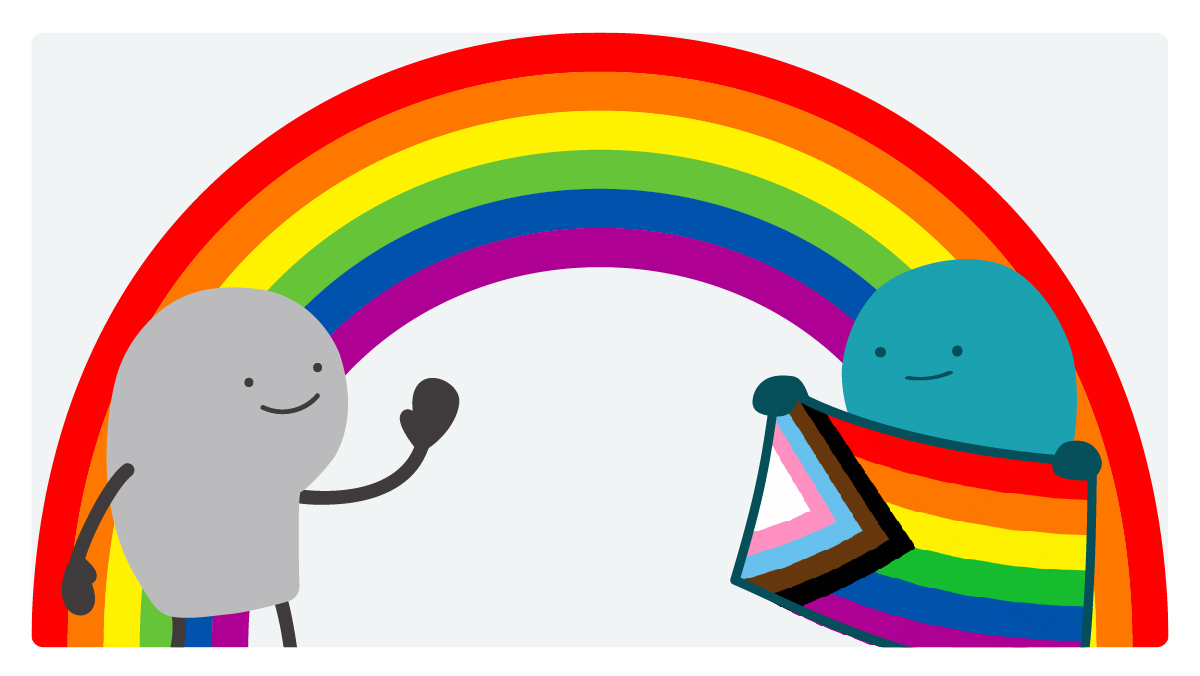
This Pride Month we’ve been reflecting on some of the amazing accomplishments of LGBTQ+ people across the country and around the world. Accomplishments made in the face of discrimination that’s existed for centuries and persists today — as demonstrated by the 300-plus anti-LGBTQ+ bills introduced in U.S. state legislatures in 2022 alone. (Note: This post was first published in 2022. To get an idea of current legislation targeting the rights of LGBTQ+ people, check out the ACLU’s tracker.)
So today we’re honoring some of the LGBTQ+ people whose contributions have shaped public health, health communication, and health education. Here are just a few of their stories.
Dr. Sophia Jex-Blake
In 1869, Sophia Jex-Blake wanted to become a doctor, but she was rejected from medical school because she was a woman. Her response? Well, to spend the rest of her career creating places for women in medicine, of course! She published an essay called Medicine as a Profession for Women and rallied a group of 6 other female applicants. The “Edinburgh Seven” then gained acceptance to the University of Edinburgh, but the school ultimately kept them from graduating. Undeterred, Dr. Jex-Blake cofounded the London School of Medicine for Women and lobbied for legislation that allowed women to take medical licensing exams. After (finally!) earning an MD herself, she became the first female doctor to practice in Scotland. Then she established another medical school — the Edinburgh School of Medicine for Women. Um, wow.
Dr. Sara Josephine Baker
The first woman to earn a doctorate degree in public health, Dr. Sara Josephine Baker helped contain New York City’s typhoid epidemic at the turn of the twentieth century. She played a key role in identifying cook Mary Mallon (aka “Typhoid Mary”) as an asymptomatic carrier and getting her out of the kitchen. When she wasn’t busy tracking down Mary — and, depending on your source material, almost getting stabbed with a fork by Mary — Dr. Baker dedicated her career to reducing infant mortality. She educated parents and community members in NYC’s poorest neighborhoods about infant care and hygiene practices like handwashing, advocating for preventive care way before it was cool, errr … a cornerstone of public health.
Dr. Bruce Voeller
Biologist Dr. Bruce Voeller played a pivotal role in early AIDS research — in fact, he even gave the condition its name. In the early years of the epidemic, AIDS was known by a few different names, including gay-related immune defense disorder, or GRIDD. Dr. Voeller very correctly pointed out that this term was both stigmatizing and inaccurate (hello, health comm!) — and coined the term we use today. Dr. Voeller went on to conduct pioneering research on using condoms and spermicides to prevent the spread of HIV. He also founded the National Gay Task Force (now the National LGBTQ Task Force) — the first group to meet with the President to advocate for the rights of gay and lesbian Americans. Dr. Voeller passed away from complications of AIDS in 1994.
Audre Lorde
Audre Lorde often introduced herself as “Black, lesbian, mother, warrior, poet.” Though she’s best known for confronting systemic racism, sexism, and homophobia through her poetry, Lorde also wrote about her experience with cancer. When Lorde was diagnosed with breast cancer in 1977, she couldn’t find any stories of Black lesbian women dealing with similar situations, so she decided to write her own in The Cancer Journals. In doing so, she gave a voice to women, people of color, and LGBTQ+ people whose experiences with cancer didn’t fit the standard narratives of the time.
Phill Wilson
In 1999, Phill Wilson cofounded the Black AIDS Institute (BAI), an organization dedicated to ending the AIDS epidemic in the Black community. Wilson saw that Black Americans were disproportionately affected by HIV/AIDS, yet they were often left out of existing education initiatives. To fill this communication gap, BAI partnered with Black community leaders and media organizations — empowering these trusted messengers to dismantle stigma and deliver important health information. Today BAI continues to mobilize and educate Black Americans about HIV/AIDS treatment and care. In addition to his work with BAI, Wilson was appointed to the President’s Advisory Council on HIV/AIDS by President Obama, served as a World AIDS Summit delegate, and cofounded the National Task Force on AIDS Prevention.
Admiral Dr. Rachel Levine
In March 2021, Dr. Rachel Levine was appointed the United States Assistant Secretary for Health under President Biden — making her the nation’s highest-ranking openly transgender official. Just a few months later, she became a four-star admiral in the U.S. Public Health Service Commissioned Corps. Earlier in her career, Dr. Levine worked as a pediatrician and clinical researcher. She also served as Pennsylvania’s Physician General and Secretary of Health, where she worked to address the state’s opioid crisis, improve maternal health, and slow the spread of COVID-19. Reflecting on her career, Dr. Levine said, “I really feel that everything I’ve ever done … has all led to this moment in terms of helping the nation through this greatest public health crisis that we have faced in over a hundred years.”
We found so many inspiring stories of LGBTQ+ public health pioneers — and we wish we could have included them all! If you have a story to share, you can respond to this email or find us on Twitter or LinkedIn. We’d ❤️ to hear from you!
The bottom line: Let’s honor LGBTQ+ people who have made key contributions to public health — this month and every month.
Copy/paste to share on social (and tag us!): In honor of #PrideMonth, CommunicateHealth revisits an all-time favorite blog post — a celebration of LGBTQ+ people who have helped shape #PublicHealth, #HealthComm, and #HealthEd: https://communicatehealth.com/wehearthealthliteracy/celebrating-lgbtq-public-health-heroes/
Browse recent posts